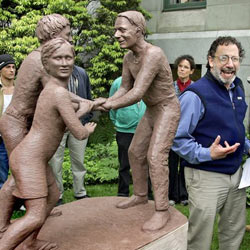 |
 |
 |
 News from Around the Americas | May 2006 News from Around the Americas | May 2006  
Soldiers Flee to Canada to Avoid Iraq Duty
 Duncan Campbell - Guardian UK Duncan Campbell - Guardian UK


| | Isaac Romano speaks at the Our Way Home peace event and reunion honoring Vietnam-era US war resisters who came to Canada. A sculpture depicting resisters being welcomed to Canada will be placed in Nelson, British Columbia. During the Vietnam war, between 50,000 and 60,000 Americans crossed the border to escape the draft. Today, hundreds of deserters from the US armed forces have crossed into Canada to seek political refugee status there, arguing that violations of the rules of war in Iraq by the US entitle them to asylum. (Chuck Stoody/AP) |
Hundreds of deserters from the US armed forces have crossed into Canada and are now seeking political refugee status there, arguing that violations of the rules of war in Iraq by the US entitle them to asylum.

A decision on a test case involving two US servicemen is due shortly and is being watched with interest by fellow servicemen on both sides of the border. At least 20 others have already applied for asylum and there are an estimated 400 in Canada out of more than 9,000 who have deserted since the conflict started in 2003.

Ryan Johnson, 22, from near Fresno in California, was due to be deployed with his unit to Iraq in January last year but crossed the Canadian border in June and is seeking asylum. "I had spoken to many soldiers who had been in Iraq and who told me about innocent civilians being killed and about bombing civilian neighbourhoods," he told the Guardian.

"It's been really great since I've been here. Generally, people have been really hospitable and understanding, although there have been a few who have been for the war." He is now unable to return to the US. "I don't have a problem with that. I'm in Canada and that's that."

Mr Johnson said it was unclear exactly how many US soldiers were in Canada but he thought 400 was a "realistic figure". He had been on speaking tours across the country as part of a war resisters' movement and had come across other servicemen living underground.

Jeffry House, a Toronto lawyer who represents many of the men, said that an increasing number were seeking asylum. "There are a fair number without status and a fair number on student visas," he said, and under UN guidelines on refugee status they were entitled to seek asylum.

The first test cases involve Jeremy Hinzman, 26, who deserted from the 82 Airborne Division and Brandon Hughey from the 1st Cavalry Division. A decision on their applications is due within the next few weeks. If they are turned down the case will be taken to the federal appeal court and the Canadian supreme court, according to Mr House, a process that would last into next year at least.

All deserters, past and present, are placed on an FBI wanted list. Earlier this month, Allen Abney, 56, who deserted from the US marines 38 years ago during the Vietnam war, was arrested as he crossed into the US, a journey he had taken many times before without problem. He was held in a military jail in California for a few days, then discharged.

"They have resuscitated long-dormant warrants," said Mr House. "I know 15 people personally who have crossed 10 or more times without problems and then all of a sudden they are arresting people. It seems like it would be connected to Iraq."

Lee Zaslofsky, 61, the coordinator of the War Resisters' Support Campaign in Toronto, said that he was impressed by the young men who were seeking asylum. "Some have been to Iraq and others have heard what goes on there," he said. "Mainly, what they discuss is being asked to do things they consider repugnant. Most are quite patriotic ... Many say they feel tricked by the military."

During the Vietnam war between 50,000 and 60,000 Americans crossed the border to avoid serving. | 
 | |
 |



